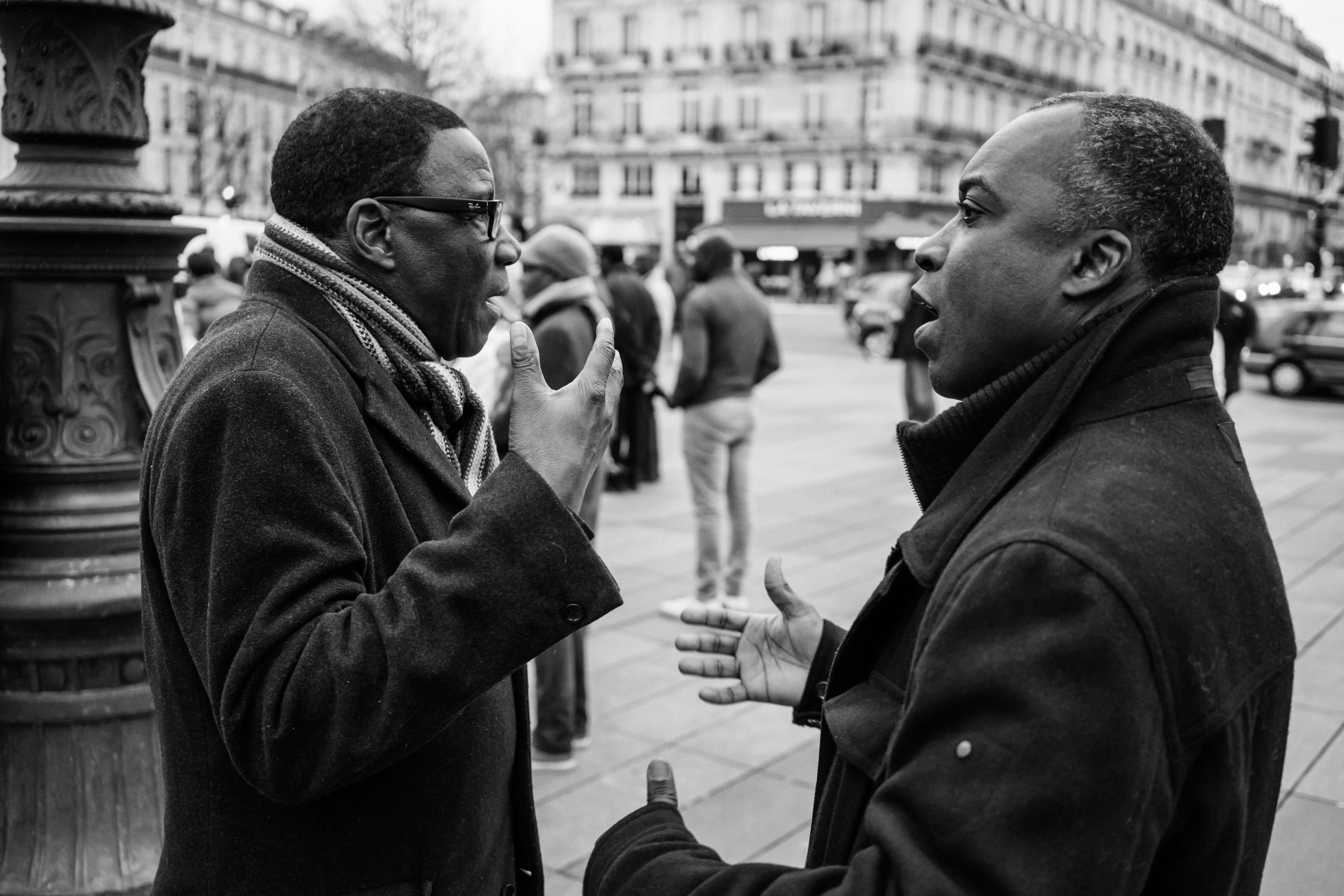Suppose a parent, an uncle or an old friend starts making claims that seem obviously wrong to you – about vaccines, the climate crisis, GMO foods, or some other topic. You’ve heard enough and feel an urge to challenge them. What should you do? What moves might you make?
In recent years, media outlets have published advice on the subject, much of it similar in that it encourages friendliness and gentle questioning, and discourages direct challenges. Based on this sort of advice, we might work up the following menu of commonly recommended and discouraged options:
Recommended
- Tailor your message: Appeal to their existing beliefs and values (‘Think about this in terms of economic efficiency…’)
- Be friendly: Listen kindly and ask (seemingly) open-ended questions (‘What do you really believe about GMO foods anyway?’)
Discouraged
- Fact-dump: Challenge your audience with contrary facts and information (‘No, a cabal of vaccine manufacturers did not pressure the editors to retract the autism-and-vaccines article; it was just bad science, because…’)
- Consistency-check: Point out that they seem to have some contradictory beliefs (‘You still see your doctor for medical advice, right?’)
To be sure, listening, being friendly and appealing to your audience’s existing beliefs are all important tools. There is good evidence to suggest that we need to be thoughtful in how we approach arguing. But should we never fact-dump or consistency-check? I believe that all of these approaches have a place in effective argumentation.
A beloved uncle of mine once bluntly stated that employers require too much education these days. Far fewer workers need a college degree than are getting one, he claimed. As a university professor (and a philosopher, no less), I think higher education is valuable even when it’s basically useless. Talking trash about it is a pretty good way to get my goat. So you can imagine my reaction, which was something like: ‘But isn’t college worthwhile anyway? Shouldn’t we want our workforce to be more knowledgeable? And what about people who work in, say, healthcare? Surely you want medical care provided by people who know more rather than less, right?’ My reaction was to consistency-check him: our beliefs, values and practices ought to be consistent with each other, and we should be able to explain any apparent inconsistencies.
It wasn’t too difficult for my uncle to provide such an explanation: the practice of administering healthcare and the practice of something like repairing radiological equipment both involve significant knowledge and skill. But in the latter case it can be attained a bit quicker, and more on-the-job. Different sorts of work require different degrees of knowledge and skill. In reply to my consistency-check, my uncle fact-dumped.
These more direct methods of arguing can sometimes seem confrontational. A colleague’s brother, a climate-change denier, once complained about the unfairness of ‘all these renewable energy subsidies’. The implication was that the government was meddling in the market merely to benefit special interests. My colleague’s husband couldn’t resist fact-dumping, pointing out that the fossil fuel sector has historically been subsidised at far higher rates than renewables.
I don’t recall the precise conclusion of my conversation with my uncle, nor do I know exactly how things turned out with my colleague’s brother. But I do recall thinking my uncle and I both made some relevant points. I’d like to think he thought so, too. So what’s behind the scepticism about our approaches to arguing?
The prevailing advice on arguing is supported by ideas and evidence in argumentation theory and cognitive science, according to which actually thinking things through is difficult and rare, and reasoning doesn’t really serve this purpose anyway. Instead, in this view, reasoning mainly enables us to justify our existing beliefs and try to persuade others. Therefore, we are susceptible to ‘myside bias’, whereby we prefer evidence that is favourable to our preconceived beliefs, while ignoring facts that are contrary to them. Many of us are also driven to find reasons to be content with the social status quo. Life is hard enough already: why upset ourselves by thinking about how unfair or unjust it is? For many people, the defensible status quo includes things like massive inequality, and fuel-burning practices that scientists tell us are degrading the planet.
A valuable lesson from this research is that, because we often fail to handle facts in an objective manner, there is more to persuasion than simply presenting our audience with contrary information. We have to think about the experiences and values of people who have very different beliefs, to imagine what is important to them, and to expect that it might be difficult for them to update their beliefs. (We also have to be mindful of our own perspectives and values, and remember that we are likely to be indifferent about relevant counter-evidence ourselves.)
It might be tempting, therefore, to conclude that if we are going to interrogate someone’s beliefs, it is pointless to ever challenge them with facts or point to apparent contradictions. This isn’t going to suddenly change their mind, so why bother?
We should still bother, at least sometimes, for a few reasons. First, even if presenting facts and consistency-checking won’t immediately change someone’s mind – indeed, even if they dig in their heels a little deeper – it’s still possible that it could ultimately influence their beliefs. Change can be plodding and difficult. We may have to argue (respectfully, even lovingly, in a spirit of exchange) many times before change occurs. Even then, we might only cause a certain amount of doubt about pre-existing views, such as occurred between my uncle and me. But that can be better than nothing.
There is now experimental evidence suggesting that, in the context of science denial, at least, declining to engage at all with a problematic source of information can result in a worse effect on attitudes than responding with facts does. If your aunt still questions the medical establishment’s refutation of a link between vaccines and autism, it is likely better to share facts with her again than to just let it go. It could be that the best outcome for now is getting her to see the tension between her view on this and something like going to the doctor for medical advice. Sowing doubt, prompting more careful thought, and raising awareness about other possibilities can all be valuable in themselves and might even lead to bigger changes later. The transformation of Megan Phelps-Roper is an incredible example of what change can happen through slow, patient engagement that prompts self-questioning. Once the social media coordinator for the Westboro Baptist Church (really, a hate group), Phelps-Roper eventually left as a consequence of engagement with critics online.
The tactics of asking open-ended questions or appealing to someone’s beliefs and values won’t always help to persuade on their own. Indeed, listening without judgment while someone shares very ignorant or prejudiced beliefs might even embolden them. As the philosopher José Medina has described it, our own ignorance is frequently invisible to us until it is met with some resistance. Without a mirror, one needs other people to tell them when food is stuck in their teeth. Similarly, the disagreement (or even disapproval or anger) of close others in response to objectionable claims can serve as a mirror through which a person might start to see themselves more clearly.
If your views are genuinely at odds with someone else’s, tailoring your message to their beliefs and values often won’t get you where you really want to go, at least without bending the truth. It might be possible to convince your relative to support some climate-change mitigation, for example, if you could convince him that it will be economically better in the long run. But if what he really cares about are coal jobs, this argument will not get you very far; in a transition to clean energy, those jobs must eventually go away. That is a simple fact of the difference between your views. Obscuring that will ultimately be ineffective.
It’s also important to consider that we have a responsibility to treat other people with respect –and that the bonds of love are their own source of duties, a point that the philosopher Barrett Emerick has explored. Love entails duties of care. If we do not try to help improve the moral personhood of friends and family members by engaging with their beliefs, we fail to care for them in a crucial way; we let them be or become less good than they might.
Some ways of arguing with a loved one – such as insulting them or lying – are obviously neither respectful nor loving. Yet even seemingly gentle methods of talking about controversial topics can easily become misleading or manipulative. Appealing to someone’s pre-existing beliefs can be manipulative if it involves bending the truth in a way that hides the real differences between your views. And while friendliness in argumentation is always a good policy, if your loved one’s beliefs or behaviour really threaten your ability to respect or get along with them, you ought to find some way to communicate that. Being superficially friendly with an ‘angry uncle’ figure, while secretly resenting and complaining about him, is ultimately not very respectful or loving.
Finally, arguing about the kind of world we want to create is part of how social progress is made, and we have a responsibility to contribute to this where we can. We are uniquely positioned to do this with family and friends, with whom we bear a special bond. Because of this bond, we might be able to re-engage in difficult conversations with them, perhaps many times over many years.
This will not always be easy. While we are often well positioned to help those closest to us improve their beliefs, we might feel especially wary of engaging with them because of our closeness. Doing so requires courage, patience and, sometimes, forgiveness. If the person you disagree with occupies a position of social power, they might not be accustomed to being challenged (or being challenged by you). When you are liable to be ignored or even harmed in some way, it might be best to leave it to others to take up an argument. You have to make careful decisions based on these factors. But the point is that respectfully – and directly – arguing with people we care about can be an opportunity, and even a duty of responsible citizenship and love. We should do so when we might make inroads with someone ‘on the other side’ – and, sometimes, even when we might not.








